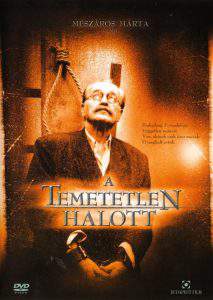“The unburied man” screened in Egypt to commemorate 1956’s Revolution

- To commemorate the Hungarian Revolution’s 62nd anniversary, the movie The Unburied Man or in Hungarian A Temetetlen Halott was screened at Cairo’s Balassi Intézet on 30 October.
 Entry was free and the movie was subtitled in English for those who did not speak Hungarian.
Entry was free and the movie was subtitled in English for those who did not speak Hungarian.
The movie is a Hungarian-Slovak-Polish drama, released on 21 October 2004, directed by Márta Mészáros, and based on the life of the former Hungarian Prime Minister Imre Nagy.
Imre Nagy, who was interpreted in the movie by Jan Nowicki, was the first political leader to become a symbol of a national revolution. As Nagy was against the Stalinist monopoly, he got off from the Warsaw Treaty and called for democracy based on a pluralist party system.
A very touching scene was Nagy’s execution. Afterwards, when he died, his eyeglasses dropped indicating his death. This scene for an Arab spectator could be linked with Omar El-Mokhtar’s execution scene that appeared in the movie Lion of the Desert. When El-Mokhtar –interpreted by Anthony Queen- was hanged up, his eyeglasses fallen indicating he passed away.
The drama’s events moved Hungarian and Egyptian attendees to the extent that some were cheering and some cried.
Hungarian diplomatic mission in Egypt, whether the embassy or the cultural center, remarkably utilized thcentre Revolution’sutilisedniversary to spread the Hungarian culture in Cairo.
On 20 October, Hungarian conductor István Dénes was invited at the Cairo Opera House to lead the Cairo symphony orchestra for the concert “Viva Hungaria”. Also soloist Peter Olah –performing on the flute- participated. Symbolizing the 1956’s RevolutSymbolisingHungaria” preformed precious tracks composed by Ferenc Erkel, Franz Doppler, Franz Liszt, and László Lajtha.
Two days after, on 22 October, the Hungarian embassy in Egypt celebrated a reception “The National Day of Hungary”. From Mezőtúr came Szivárvány Zither Orchestra. With their traditional costumes, the band opened the gate to the attendees to discover the Hungarian folkloric culture.
Last but not least, on 30 October, A Temetetlen Halott was screened at Cairo’s Balassi Intézet.
Expressing the significance of these events, Hungarian Ambassador to Egypt this is what the Hungarian Ambassador to Egypt Péter Kveck told Daily News Hungary “For Hungarians Culture is our Life.”
Source: By Maydaa Abo El-Nadar





